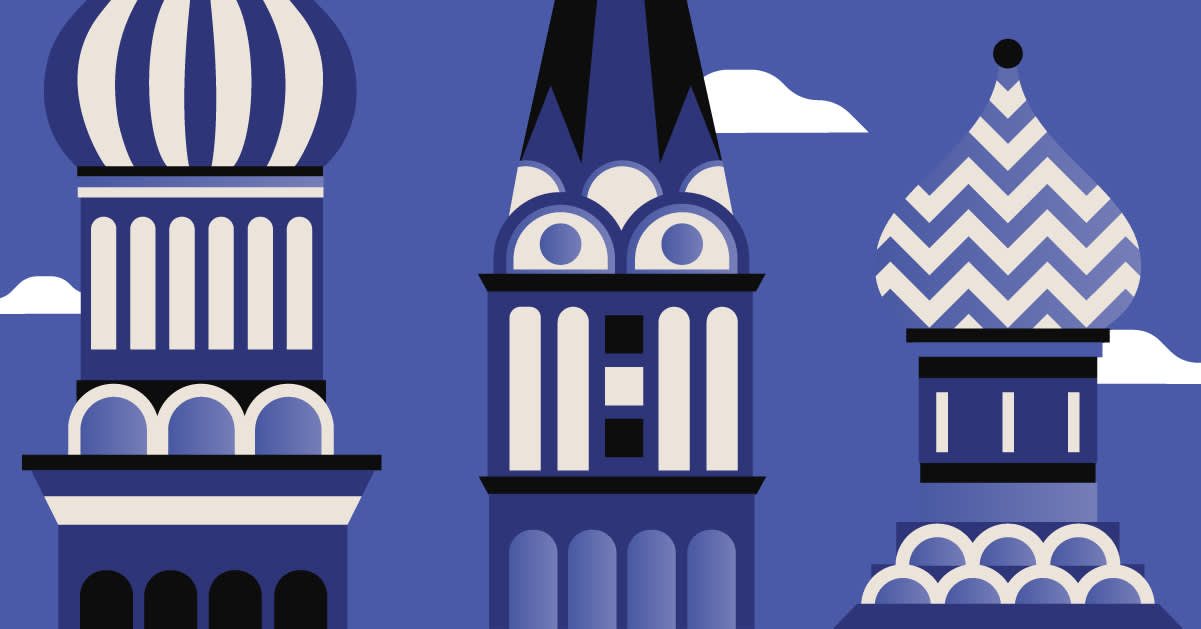Russia is a sprawling country with a rich and complex history, which is reflected in its literature. While many English-speaking listeners may be familiar with some of the famous classic Russian novelists and short story writers, a growing number of contemporary Russian books are finding new audiences in translation. Whether you’re keen on brushing up on classic Russian literature or you want to find a new author to explore, we’ve done the tough job of rounding up just 13 of the best Russian authors, classic and contemporary, whose work you should know.
Often regarded as the founder of Russian literature, Pushkin was born in 1799 to a noble family. His gift with words emerged early, but also put him in peril. His poem “Ode to Liberty” resulted in his being exiled by the tsar, although he was eventually allowed to come back to court. He wrote many poems and plays but considered his greatest work to be a novel in verse called Eugene Onegin, about three men and the women they love in 1820s Russia. Pushkin died in 1837 after challenging his brother-in-law to a duel.
2. Leo Tolstoy
Leo Tolstoy is one of the best-known Russian writers, and his novels are considered great classics. He was born in 1828 and lived until 1910. During his lifetime, he penned novels, short stories, plays, and essays. He was nominated repeatedly for a Nobel Prize, although he never won. In the 1880s he underwent a spiritual transformation, which he wrote about at great length, and his philosophies went on to inspire the nonviolent social justice movements of Mahatma Gandhi. His most famous works include Anna Karenina (an Audible exclusive narrated by Maggie Gyllenhal), The Death of Ivan Ilyich, and War and Peace. His novels are epically long, but his philosophy books, parables, and essays—including The Kingdom of God Is Within You, Three Questions, and Where God Is There Is Love Also—are more concise and make for timeless nonfiction listening.
Anton Chekhov is considered one of the greatest short story writers of all time and one of the founders of modernism in theater. Born in 1860 to a poor family, he had an unhappy childhood. He studied medicine and often wrote sketches and anecdotes about country life, first to entertain his family and then to sell to newspapers and periodicals. He continued to write, even after becoming a doctor, but it wasn’t until the late 1880s that he began to think seriously about writing as an art rather as a way to entertain or make money. During his time, he often engaged in political writing and became an advocate for the poor and disenfranchised. He died of tuberculosis in 1904, leaving behind a tremendous literary legacy. His Five Plays include The Seagull, The Cherry Orchard, Uncle Vanya, The Three Sisters,” and The Boor, and readers can experience them with a full-cast performance. Readers can also enjoy Chekov’s short stories in two volumes (one and two), both narrated by Anthony Heald.
“Pain and suffering are always inevitable for a large intelligence and a deep heart,” says Raskolnikov, the protagonist of Dostoyevsky’s great novel Crime and Punishment. But the fictional murderer could have been talking about his own creator. Dostoyevsky enjoyed local literary success with the publication of his first novel in the mid-1840s, but it was only after he was sentenced to death by firing squad, then sent to brutal imprisonment and exile in Siberia, that he turned out some of the finest novels ever written in any language. Working feverishly to pay off his gambling debts, Dostoyevsky produced fiction known for its tormented characters and visionary philosophical depths. From Crime and Punishment, an engrossing detective novel considered to be the first psychological thriller, to his polyphonic opus The Brothers Karamazov, to the politically tinged Notes from the Underground, Dostoyevsky became beloved by and vastly influential to many subsequent generations of novelists.
Boris Pasternak was a writer, translator, and poet. He was born in 1910 to an assimilated Jewish family, who counted Leo Tolstoy among their close personal friends, (His father illustrated Tolstoy’s work. But throughout the revolutions and political unrest of the following decades, Pasternak’s political beliefs and literary work would put him at odds with the Soviet government when he finished his novel Doctor Zhivago in 1956, no one would publish it because of its anti-Soviet sentiments. However, Pasternak took a great risk to have the novel smuggled to Italy, where it was published to international success. In fact, even the CIA and MI-6 had a hand in seeing that it was considered for the Nobel Prize, hoping its win would damage the USSR’s Communist agenda. Pasternak won the award in 1958, but had to refuse it or face exile and he died just two years later. In 1988, 28 years after his death, his descendants were finally able to accept his Nobel Prize in 1988.
Aleksandr Solzhenitsyn is best known for his writing about life as a political prisoner under Soviet leadership. Born in 1918, he served in the Red Army during World War II and soon grew disillusioned with the country’s leadership. He was arrested for making derogatory comments about Stalin in a private letter and imprisoned in labor camps. He was freed in 1956, and soon after, he published One Day in the Life of Ivan Denisovich. It became an instant hit and helped elevate the treatment of political prisoners in the USSR from the West, but it was the only book he was allowed to publish in his native country. His following works, August 1914, Cancer Ward, In the First Circle, and The Gulag Archipelago were all published outside of the country. Solzhenitsyn was exiled in 1974, although he was able to return to Russia after 1990 and remained until his death in 2008.
One of the most magnificent prose stylists of all time, Vladimir Nabokov was born in Russia in 1899. His family was forced to flee Russia after the 1917 revolution, and he settled in Berlin, where he was somewhat famous as a poet and writer. His first nine books were written in Russian, but he did not achieve fame until he and his family fled unrest in Germany for the United States, where he wrote Lolita, his most famous—and controversial—work (written originally, like his later books, in English). He died in Switzerland in 1977. Among his best-known works are Lolita (narrated by Jeremy Irons), Pale Fire, Invitation to a Beheading, The Gift, and a dazzling autobiography, Speak Memory.
Mikhail Bulgakov was a playwright and novelist who struggled in his lifetime to find success as a writer. Born in 1891, he wrote plays that often put him in peril with the Soviet government—although Stalin often stepped in to defend him. Nonetheless, his career often faltered, and he spent his final years trying to finish his greatest novel The Master and Margarita. It was so critical of Sovietism that his widow didn’t publish it until 1966, more than 25 years after his death. The novel, which is a satire about Satan visiting Moscow, is one of the best-selling Russian books of the 20th century.
Ludmila Ulitskaya, born in 1955, is one of Russia’s most popular contemporary writers. She began writing when she served as a consultant for a Jewish theater group, and has since published 11 novels and one short story collection, including Jacob’s Ladder, Medea and Her Children, and Daniel Stein, Interpreter. Her best known work in the US is The Big Green Tent, which listeners can enjoy as an Audible Original narrated by Jonathan Davis. It tells the story of three friends living in the Soviet Union as dissidents throughout the decades following Stalin’s death, and it has won numerous international awards.
10. Guzel Yakhina
Born in 1977 in Kazan, Guzel Yakhina was inspired by her grandmother’s experience of being banished to Siberia during the Tartar relocation in the 1930s. Although she’s only written two books, one of which has been translated into English, her debut novel, Zuleikha was a tremendous success. Among many awards in her homeland, it won the Big Book literary prize, and was shortlisted for the Russian Booker Award. Narrated by Elisa Arsenault, Zuleikha was also adapted into a film won the English Pen Award.
Ludmilla Petrushevskaya is considered one of Russia’s greatest living writers, and has written numerous plays, short stories, and novels. She spent her early career writing plays and toeing the line with Soviet censors, but when reforms allowed her to publish more of her short stories, she became an overnight sensation. While many of her short stories and some of her novels are available in print in the US, her moving memoir Girl from the Metropol Hotel is the only book available on audio, narrated by actress Kate Mulgrew. It tells the story of Petrushevskaya’s childhood growing up in the Metropol Hotel before being abandoned by her father and fleeing from the police with her mother.
Sergei Lukyanenko is a sci-fi and fantasy writer, one of the best known in Russia. He began writing in the 1980s, and was one of the few writers who managed to find a publisher and career after the fall of the Soviet Union and the switch to market economy, partly due to the demand for his novels. His breakout hit was the Night Watch series, which was made into a Russian movie and was released in the US. There are six books in the Night Watch series, , all narrated by Paul Michael. He has one other standalone sci-fi thriller available in the US: The Genome, narrated by Scott Aielio.
13. Boris Akunin
Boris Akunin is a contemporary Russian author of mysteries and historical fiction. Although he spent most of his life in Moscow, he now lives in Europe, where he writes and edits. His most popular series is the Erast Fandorin mystery series, set in Russia in the 1870s and starring a young detective with the Moscow Police. His series has inspired four major Russian movies, and his other works have been adapted for film and TV. The latest installments in his Erast Fandorin series are available as audiobooks, narrated by Nigel Patterson.
With so many great works of Russian literature to choose from, what will be your next listen?
Tirzah Price is a writer and contributing editor for Book Riot.




